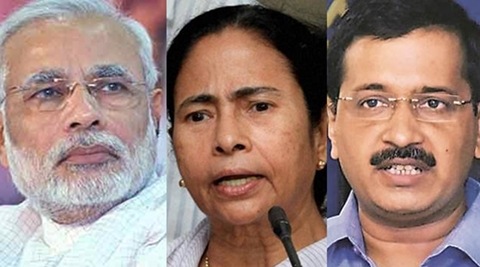Notwithstanding their ideological differences, Bihar Chief Minister Nitish Kumar and Prime Minister Narendra Modi have supported each other on important issues. This is not the case with Delhi Chief Minister Arvind Kejriwal and his West Bengal counterpart Mamata Banerjee. In the last few months, the duo has almost launched a war against the Centre on almost every issue — be it the surgical strikes carried out by Indian Army on terror launch pads in Pakistan-occupied Kashmir or demonetisation to curb black money and corruption.
True that demonetisation put crores of people in trouble, but protests by Kejriwal and Mamata didn’t help ease the situation. This war, however, is not one-sided as Modi government has not been able to take the protesting leaders into confidence. It is quite possible that Banerjee and Kejriwal are hell bent on opposing everything Modi government does, but the Centre can’t shrug off the responsibility of reaching out to them in full public view, not once but multiple times.
Banerjee is running a “Modi hatao, desh bachao” campaign across West Bengal. Kejriwal is busy making allegations against Modi and the PM leaves no opportunity to take a jibe on these two leaders. For now, the Modi-Mamata-Kejriwal conflict has reached a level that any rapprochement is not visible in near future.
We strongly condemn the political vindictive attitude of Narendra Modi and Amit Shah 1/3
— Mamata Banerjee (@MamataOfficial) January 3, 2017
The West Bengal CM, who had earlier vowed to ensure the end of Modi’s career, today called for his removal from the PM post, demanding the formation of a “national government” led by another BJP leader. “In the current situation, a national government should be formed with another BJP person at the helm. He (PM Modi) has to go. To save the country, let a national government be formed. Advaniji, Rajnathji or Jaitleyji can head it,” ANI quoted Banerjee as saying.
Whoever wins or loses in the ongoing conflict is immaterial as everyone knows the real victims — people of Delhi and West Bengal and Centre-state relations. Ironically, after coming to power in 2014, PM Modi had abolished the Planning Commission and launched Niti Aayog for “radically redefining” the Centre-State relationship by promoting cooperative federalism. The ongoing Modi-Mamata-Kejriwal conflict is now derailing the Aayog’s mission.
Demonetisation could have been more successful if all parties would have supported the decision as well as shown the sensitivity to urge people to adopt cashless means of transaction. Not just demonetisation, the protesting stance by the leaders now threatens to derail the implementation of GST.
ALSO READ Why Mamata Banerjee is hell-bent on destroying peace in West Bengal
Banerjee’s Trinamool Congress (TMC) on Thursday said it would not support the Centre on GST. TMC leader Saugata Roy said West Bengal government would not cooperate with the Centre anymore in rolling out the Goods and Service Tax (GST) and TMC’s protests would continue. Banerjee has accused the Centre of imposing a “financial emergency” in the country in the name of demonetisation. Not only this, West Bengal Finance Minister Amit Mitra walked out a GST meeting saying there was a “political environment of fear”.
Banerjee and Kejriwal have the option of taking some lessons from the Bihar CM as the latter has not only maintained a cordial relation with the Centre but also used demonetisation to enhance his own image as a national leader.
ALSO READ: Will PM Modi oblige ‘friend’ Nitish by following note ban with booze ban?
“An eye for an eye leaves the whole world blind.” This famous quote frequently attributed to Mahatma Gandhi is very much relevant in the theatre of political conflict playing across the country today. Had Gandhi been alive today, he would, “Opposition for the sake of opposition can sink the entire country.” In the last few months, AAP, BJP and TMC have shown their acute incapability in burying the hatchet for the good. PM Modi himself says that political interests shouldn’t come in the way of governance. However, even if Kejriwal and Mamata can’t, can PM Modi make an attempt to end the conflict?

